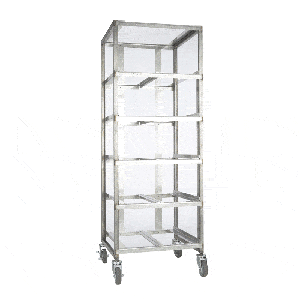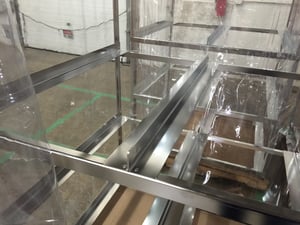 Sanitation is an enormous concern in the manufacturing of pharmaceutical products. Trace contaminants in a pharmaceutical could turn a curative product into a health hazard—which is why the FDA applies incredibly strict sanitation control requirements on manufacturers in the pharmaceutical industry.
Sanitation is an enormous concern in the manufacturing of pharmaceutical products. Trace contaminants in a pharmaceutical could turn a curative product into a health hazard—which is why the FDA applies incredibly strict sanitation control requirements on manufacturers in the pharmaceutical industry.
One of the bigger challenges in maintaining sanitation in the pharmaceutical manufacturing process is keeping products, containers, and tools contaminant-free when moving them between processes. However, this is a challenge that custom rolling carts can help with.
Limiting Exposure to Contaminants
When moving products, containers, and/or tools between processes in the same room, there’s an inherent risk of particulates in the air settling on them. This risk is multiplied when moving products between different rooms in a building.
A custom stainless steel cart, when equipped with a removable cover, helps limit the exposure of carried baskets, tools, and pharmaceutical products to particulates in the air. This makes maintaining sanitary conditions for everything the cart carries that much easier.
When equipped with a removal cover, the cart is also easy to clean in between uses.
Ensuring Ease of Sanitation
 Adhering to basic sanitation standards requires equipment that is hostile to bacteria, doesn’t provide sizeable nooks or crannies where runoff or contaminants my gather, and is easy to sanitize. Custom rolling carts can achieve all of these with some smart design.
Adhering to basic sanitation standards requires equipment that is hostile to bacteria, doesn’t provide sizeable nooks or crannies where runoff or contaminants my gather, and is easy to sanitize. Custom rolling carts can achieve all of these with some smart design.
First, the use of electropolished stainless steel creates a surface that is microscopically smooth. This eliminates the miniscule grooves or pits that could otherwise harbor germs or undesirable particle matter.
Since the surface is so smooth, contaminants have little opportunity to find purchase—making sanitizing the cart easy. The rust-resistant nature of stainless steel helps to preserve the smoothness of the surface, so it will continue to be easy to sanitize.
Another factor that helps make stainless steel carts easy to sanitize is their high temperature tolerance. These carts can withstand temperatures that would melt polymer carts and baskets. This allows for high temperature cleaning methods to be applied to the carts, which can kill drug-resistant bacteria and viruses that would survive purely chemical-based sanitation methods.
Preventing the collection of process runoff and particles is something that depends on good design. This is also true of making sure every part of the cart is accessible for easy cleaning. By using the right materials and a well thought-out design, a custom rolling cart can be made incredibly easy to keep sanitary.
Ease of Movement
One of the biggest reasons to use a cart with rollers over simply carrying individual baskets of parts/products between processes is that the cart makes it easier to move between processes without jostling the load.
How does this contribute to sanitation?
Primarily, it reduces the risk of dropping parts or products while they’re being moved. Having a part or product fall out of a basket while it’s being moved may mean having to re-sanitize or even remanufacture it.
Plus, the added benefit of being able to move many fully-loaded baskets at once can help improve production efficiency by limiting the number of round trips employees have to make to carry products or parts between manufacturing processes.
By being easy to sanitize and easy to move, as well as limiting contamination, custom stainless steel rolling carts can actually help pharmaceutical manufacturers maintain (or improve) their adherence to sanitation standards!



.gif)


